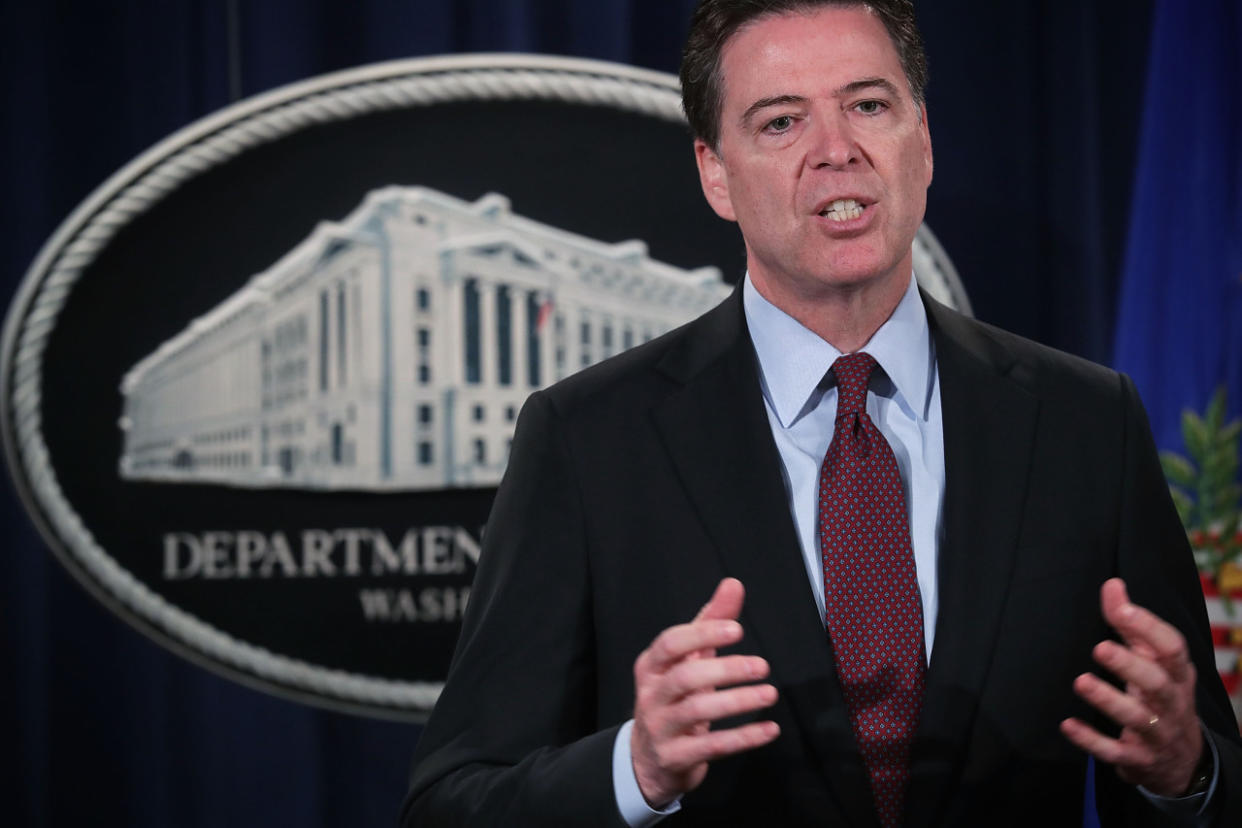Steep decline in U.S. recruits to ISIS, FBI chief James Comey says

FBI Director James Comey speaks during a news conference in March in Washington, D.C. (Photo: Alex Wong/Getty Images)
FBI Director James Comey said the Islamic State’s ability to recruit fighters from inside the U.S. to wage war in Syria and Iraq has sharply diminished over the past year, citing new figures that he says show the terror group has “lost significant power” inside the country.
“They’ve lost their ability to attract people to the caliphate from the United States,” Comey told reporters at a briefing at bureau headquarters Tuesday.
At the same time, Comey said the Islamic State is still attracting “troubled souls” through social media who pose potential terror threats, resulting in more than 1,000 active FBI investigations into online recruitment — a slight increase from over a year ago. He cited in particular the San Bernardino terrorists, Syed Rizwan Farook and his wife, Tashfeen Malik, who the bureau has concluded were primarily influenced by what he called the Islamic State’s “poison and propaganda” online.
The comments by Comey amplify recent testimony and other public comments by government officials suggesting that U.S. counterterrorism efforts, both here and in the Middle East, have had some impact in blunting the Islamic State’s advance even while the group remains a persistent threat to launch attacks, especially in Western Europe.
In 2014 and 2015, “we were seeing 6 to 8 to 10 people a month trying to travel or successfully traveling” from the United States to Syria and Iraq to fight for the Islamic State, Comey said.
“But since last August, it has averaged about one a month,” Comey said. “That trend is now sustained. There is no doubt something has happened that is lasting in terms of attractiveness of the nightmare that is the Islamic State.”
Comey did not offer an explanation for the precipitous drop-off. But another U.S. law enforcement official, who asked not to be identified, said a leading theory inside the intelligence community has been the impact of U.S air strikes in killing some high-ranking Islamic State leaders who were key players in the terror group’s social media efforts, such as British hacker Junaid Hussain, who was killed last August during a military strike in Raqqa, Syria. “People matter,” said the official, noting that the elimination of terrorists with specialized skills can make a difference.
More broadly, military setbacks the Islamic State has suffered over the past year — including losing 40 percent of its territory in Iraq — has made a difference, diminishing the Islamic State’s luster, according to Patrick Skinner, a former CIA terror analyst who now tracks the foreign fighter phenomenon for the Soufan Group, an international security firm.
“The fever broke in 2014, that’s when the [flow of the foreign fighters] peaked,” said Skinner. “Now there’s no way for them to spin their way out of the fact they’re having their ass handed to them.”
In his comments, Comey said the FBI was still deeply concerned about the threat posed by the return of foreign fighters, either to the United States or to western Europe. And, in the wake of the FBI’s much publicized court battle with Apple over unlocking the iPhone used by the San Bernardino killers, he predicted there could be another court fight down the road with WhatsApp, the text, audio and video messaging platform for smartphones (owned by Facebook) that has become an increasingly popular tool for terrorists because of its promise to end encryption.
“WhatsApp has over a billion customers and they are overwhelmingly good people,” he said. “But in that billion customers are terrorists and criminals. … It’s a huge feature of terrorist tradecraft.”
Comey said that, while “data at rest” — encrypted devices such as the iPhone — are primarily a problem for law enforcement, “data in motion” — encrypted apps such as WhatsApp — are “overwhelmingly” a problem in national security cases, making it much harder for the FBI to execute wiretaps in intelligence and terrorist investigations. “Whether there is going to be litigation, I don’t know,” Comey said. But he added: “That collision is going to happen, just the way it’s happening in data at rest.”
The use of encryption, he added, “is now essential tradecraft of ISIS and other terrorist groups, but especially ISIS.”


